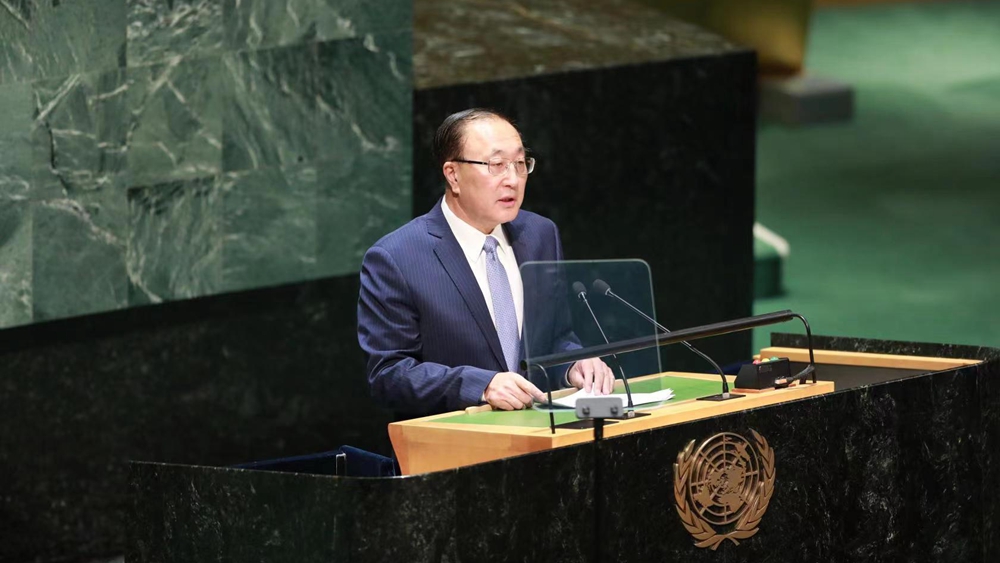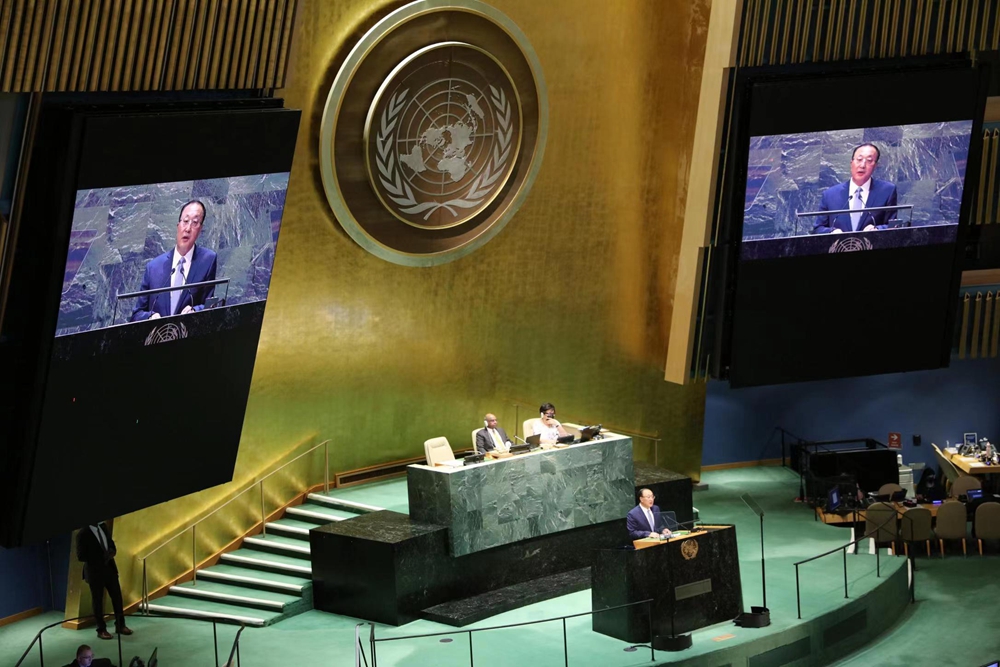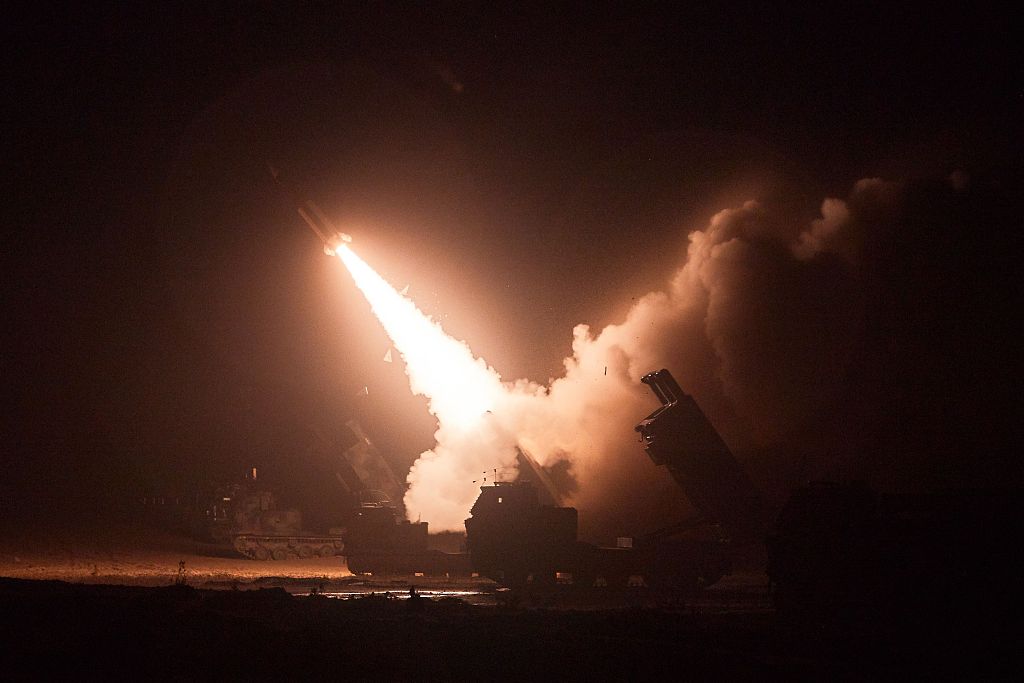
Zhang Jun, China's permanent representative to the UN, speaks at a UN General Assembly debate on the Korean Peninsula issue at the UN headquarters in New York, June 8, 2022. /Xinhua
Zhang Jun, China's permanent representative to the UN, speaks at a UN General Assembly debate on the Korean Peninsula issue at the UN headquarters in New York, June 8, 2022. /Xinhua
Zhang Jun, China's permanent representative to the United Nations (UN), on Wednesday urged the United States to take meaningful and concrete actions to relieve tensions on the Korean Peninsula.
"Where the situation goes from here will depend, to a large extent, on the actions of the U.S., and the key lies in whether the U.S. can face up to the crux of the problem, demonstrate a responsible attitude, and take meaningful and concrete actions," Zhang said, calling on all parties to "avoid any action that could escalate tensions and lead to miscalculation."
Zhang made the remarks at a UN General Assembly debate on the Korean Peninsula issue, the first of its kind since the General Assembly adopted a resolution on April 26 that allows it to convene automatically when a veto is cast in the Security Council. On May 26, China and Russia vetoed a Security Council draft resolution aimed to impose new sanctions on the Democratic People's Republic of Korea (DPRK), triggering the General Assembly meeting.
The envoy said the recent escalation of tensions on the peninsula was primarily a result of the "flip flop" of U.S. policies, its failure to uphold the results of previous dialogue, and its disregard for the reasonable concerns of the DPRK.
Since the DPRK took denuclearization measures in 2018, the U.S. side did not reciprocate, did not address the DPRK's legitimate and reasonable concerns, nor did it demonstrate the necessary sincerity for resolving the issue, said Zhang.

Zhang Jun addresses the UN General Assembly debate on the Korean Peninsula issue at the UN headquarters in New York, June 8, 2022. /Xinhua
Zhang Jun addresses the UN General Assembly debate on the Korean Peninsula issue at the UN headquarters in New York, June 8, 2022. /Xinhua
"The U.S. side did not respond according to the action-for-action principle, and instead returned to the old path of strategic patience and maximum pressure, chanting empty slogans for dialogue and increasing sanctions against the DPRK, which intensified the DPRK's distrust of the U.S., and brought the talks to a complete deadlock," he said.
To fundamentally resolve the peninsula issue requires "following the general direction of political settlement, dialogue and consultation," while "abandoning the old approach of imposing sanctions and exerting pressure," he said, calling on the Security Council to play a constructive role.
Zhang also criticized the U.S. for advancing its "Indo-Pacific strategy" and aggravating the risks of military confrontation in the region.
"It is not in the interests of any country to stoke bloc confrontation in the Asia-Pacific region. We urge the countries concerned to put regional peace and security first, stop political maneuvering, change course immediately, and create a good environment toward peace and stability on the peninsula," he said.
The DPRK's UN Ambassador Kim Song denounced all UN sanctions and the proposed resolution as "illegal," saying they violate the UN Charter and his country's right to self-defense to prepare for any potential security crisis on the peninsula and in the region.
He said modernizing the DPRK's armaments is essential to safeguard its interests "from direct threat of the United States," which he said has made no move "to abandon its hostile policy."
Anna Evstigneeva, Russia's deputy UN ambassador, said new sanctions against the DPRK "would be a dead end," stressing that current UN sanctions have failed to guarantee security in the region "nor moved us any further toward settling the nuclear missile non-proliferation issues."
Jeffrey DeLaurentis, U.S. deputy ambassador to the UN, said the DPRK's latest missile launches have taken place as the country "is finalizing preparations for a potential seventh nuclear test."

South Korea and the United States fire a missile from an undisclosed location on South Korea's eastern coast, June 6, 2022. /CFP
South Korea and the United States fire a missile from an undisclosed location on South Korea's eastern coast, June 6, 2022. /CFP
The debate took place amid escalated tensions on the peninsula. The DPRK fired a series of ballistic missiles in May – before and after the inauguration of South Korean President Yoon Suk-yeol. Seoul claimed that Pyongyang has completed preparations for a nuclear test.
South Korea and the U.S. fired eight ballistic missiles into eastern waters on Monday, a day after South Korea said the DPRK had launched eight short-range ballistic missiles.
DPRK leader Kim Jong Un said in late April that the country will develop its nuclear capabilities "at the fastest pace." He stressed that the fundamental mission of the DPRK's nuclear force is to deter war.
Denuclearization talks have been stalled for over three years since the collapse of a summit between Kim and then U.S. President Donald Trump in Vietnam's Hanoi in February 2019.

